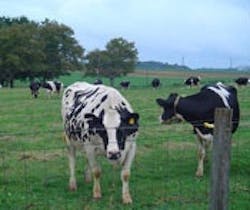California Central Valley Approves New Water Quality Dairy Rules
Source Fresno Bee
A new rule has passed that attempts to help control the manure-laden waste at dairies in California’s Central Valley.
For the first time, about 1,600 dairies will need to have wastewater permits, submit reports on soil and pond conditions, and will eventually need to install wells that can monitor groundwater pollution.
Fresno Bee reports that the new regulations were unanimously approved by the Central Valley Regional Water Quality Control Board. The rules will be put in place even though agriculture leaders fear that the regulations were too costly and environmentalists worry that the rules have too many loopholes.
Board member Christopher L. Cabaldon told the Fresno Bee that the rules were not perfect, but it is a good way to begin making sure that dairies are not hurting the water quality in California.
For decades California law has stated that the state's regional water boards must enforce water quality standards and regulate wastewater discharges for various industries. Until recently, the Valley agriculture industry had been operating under a waiver program that calls for little supervision.
The approved dairy program comes after years of debate and analysis.
Environmentalists are particularly concerned about nitrates, which can come from dairy waste. Nitrates have been linked with cancer, pregnancy risks and a blood disorder called methemoglobinemia, or "blue-baby syndrome." Central Valley water board told Fresno Bee that water taken from 88 Tulare County dairies in recent years showed that at least one nitrate-polluted well was found at 63% of the dairies.
However, industry officials claim that there is no proof that dairies are to blame because pollutants could come from cities, septic tanks, other farming operations or other industries or could occur naturally.
Under the new regulations, groundwater monitoring will be eased in at the anticipated rate of 100 to 200 dairies per year, beginning with dairies suspected of having high nitrate levels.
Fresno Bee reports that in order to comply with the new rules, it will cost a 1,000-cow dairy as much as $56,000 initially and as much as $36,000 annually, board staff members said.
The rules will affect dairies in operation on Oct. 17, 2005. A separate program is currently in development for newer dairies.
Source: Fresno Bee
